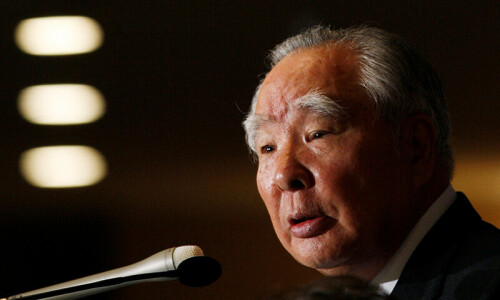THERE is great anguish felt by many people in Pakistan regarding the ugly incident at Jaranwala. As was reported, a mob torched several churches, ransacked Christian homes and vandalised a graveyard in this area. The apparent provocation was alleged blasphemy committed by a Christian. This provided an excuse to local preachers to incite people and unleash a reign of terror on churches and the homes of this particular faith community, whose contributions, particularly in the field of education, are immense. Many leaders in our country feel proud of graduating from schools run by the Christian community.
It may be noted that all such events often start with rumours. Somebody sees or pretends to have seen a person, even an illiterate person, desecrate a page or a few verses or made some reprehensible statement about Muslim holy personalities or beliefs. These rumours are spread to create a big fuss and then, religious leaders in the mohalla kindle the fire by making announcements on loudspeakers to invite people to ‘punish’ the ‘guilty’.
One may ask what advice the Quran gives about addressing rumours. “If a wicked person comes to you with any news, ascertain the truth, lest ye harm people unwittingly, and afterwards become full of repentance for what ye have done” (49:6), says the Holy Book.
If someone leaves a couple of torn pages at someone’s door, and then raises a hue and cry that this person has abused the Quran, should Muslims punish this person or burn down his house?
We must treat all as equal citizens, worthy of respect.
Let us consider yet another verse, which again refers to rumour-spreading and gives a ‘policy statement’ — to use a modern term — or a set of ‘SOPs’ when it comes to news (or fake news) relating to public safety. It says: “When there comes to them some matter concerning (public) safety or fear, they divulge it. If they had only referred it to the Messenger [PBUH], or to those charged with authority among them, the proper investigators would have tested it from them (direct). Were it not for the Grace and Mercy of Allah unto you, all but a few of you would have followed Satan” (4:83).
See how the Quran deals with a major problem in the context of pre-modern Arabia! Mischief-mongering has long been part and parcel of human society, and the revelation rightly addresses it in the most common-sense way. The government can insist on making such Quranic verses key policy guidelines while tackling such events. Today, fake news has become such a nuisance that many, unfortunately, even profit from deliberately spreading it. First, the Quran advises not to create fasaad (corruption) in the world with excuses. Second, even if news or a rumour reaches someone, they should not jump to conclusions, but investigate the allegations through those who are responsible for such things.
Just imagine if a rumour like the one in Jaranwala proves to be false, what benefit would the alleged perpetrator get by doing such a senseless thing, unless there is an agenda behind it? Some people do such things to make a statement in a certain sensational way because they have an agenda, such as promoting Islamophobia. But we now have a new twist to the story. The Punjab police chief says that a “network of hostile intelligence agencies” was allegedly involved in the recent incidents of blasphemy across the country. Does it change the consequences we have already faced in terms of loss — both material loss, and more importantly, the loss of trust between communities? Even if the news is correct, does it change the substance of the event?
Reflecting on these human instincts, the Quran says: “Did not Allah check one set of people by means of another, there would surely have been pulled down monasteries, churches, synagogues, and mosques, in which the name of Allah is commemorated in abundant measure.” (22:40).
Other than what many learned authors have proposed where long-term suggestions go, I, for one, argue that these things cannot be dealt with by only post-facto actions, but through sustained pre-emptive actions; through civic engagement that teaches humanism, pluralism and cosmopolitanism. We need to treat all as equal citizens, worthy of respect.
This may be done through re-education, both public and formal, apart from legal measures. Re-education, because our current approach to education — both secular and religious — encourages an exclusive rather than inclusive approach. Let us show practically that ‘Islam is a peaceful religion’. In a Muslim-majority society like ours, let us demonstrate people are safe from the harm of our hands and tongues, as our Prophet (PBUH) expected from his faithful followers. Let us say “Assalam Alaikum” (peace be upon you) to all with the heart, not from the lips as a mere ritual!
The writer is an educationist with an interest in the study of religion and philosophy.
Published in Dawn, September 1st, 2023













































Dear visitor, the comments section is undergoing an overhaul and will return soon.